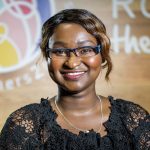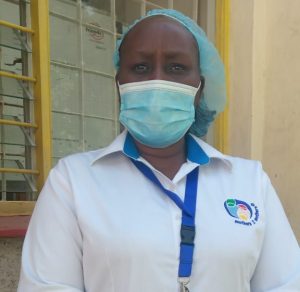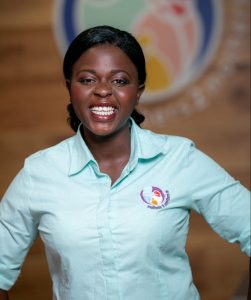You Can’t Spell “Hero” Without “Her”: Honouring Female Health Workers
World Health Worker Week, commemorated between 5-9 April, is an opportunity to honour the sacrifices and unwavering dedication of health workers, which is especially poignant given the unimaginable challenges they have faced this past year. Women account for 70% of the global health and social care workforce—and this includes the more than 1,700 women living with HIV mothers2mothers (m2m) employs as frontline health workers across 10 countries in sub-Saharan Africa.
World Health Worker Week 2021

m2m Community Mentor Mother Team Leader, Wilbroda Awuor Akuro, Kenya
Designated as essential workers during national lockdowns, these Mentor Mothers have remained more determined than ever to ensure women and their families get the health services, education, and support they need in the face of not one, but two pandemics—HIV and COVID-19.
Wilbroda Awuor Akuro, a Community Mentor Mother Team Leader in Nairobi, Kenya, sums up the commitment of these inspiring women: “What gives me hope during this time is the fact that we did not go into hiding and wait for the pandemic to be over and then come back. No, we stood with our clients. We ensured that they received health services. We ensured that they stayed safe during this pandemic. As a result, we are going to come out stronger, better, and more knowledgeable.”
At m2m, this week (and every week!) we are shining a light on these heroes. Here are some of the challenges they have faced in recent months, and how they are going the extra mile to make sure their clients stay safe and healthy during these unprecedented times:
“The long wait for the vaccine has been economically devastating. Our clients are demotivated as most of them have lost their jobs and livelihoods. This has resulted in them relocating to the rural areas which makes it more difficult to keep them in care. This never-ending pandemic has resulted in increases in gender-based violence and teenage pregnancy. Our clients are terrified and exhausted, but Mentor Mothers are always there to lift them up and support them to get the services they need, no matter where they are.

m2m Mentor Mother Team Leader, Jane Njoki, Kenya
“What keeps me going is the fact that this is not the first pandemic that we have confronted. We have faced the HIV pandemic head-on and are well on our way to defeating it. I am also motivated when I see my clients adhering to the COVID-19 safety protocols that we have been educating them about and adhering to their antiretroviral treatment.” — Jane Njoki, Mentor Mother Team Leader, Nairobi, Kenya
“It is essential for Mentor Mothers to continue to provide our normal services, including educating adolescents and young women about HIV and reproductive health. This population is so vulnerable and their health needs have not gone away with COVID-19… A pregnant client told me she had not gone to the clinic for her regular check-up because she was scared of COVID-19. Other clients are not coming in to pick up their HIV medication for the same reason. I call them and explain why it is important to stay in care and on treatment, and support them to get the health services they need. I am doing what I love. I’d rather be in the health centre than anywhere else, making a difference for people in my community. That is where my heart is.”— Nolundi Pani, Mentor Mother who runs m2m services for adolescent girls and young women in Khayelitsha, South Africa.

m2m Mentor Mother & Site Coordinator, Teddy Atim, Uganda
“The second wave of COVID-19 has been so difficult for us in the rural villages. Villagers are scared and are starting to lose hope. Everyone has been affected, even students are not allowed to go to school until the vaccines are introduced and the wait for the vaccines is long. This has also resulted in increased teenage pregnancies due to female students being left with nothing to do and high levels of school dropouts. Also, not helpful to the situation is the lack of access to educational information regarding COVID-19 in rural areas. However, as Mentor Mothers, we live in the same communities and play a role in bridging that gap, and support and educate our clients to get the health services they need.” — Teddy Atim, Mentor Mother and Site Coordinator, Namayingo District, Uganda

m2m Mentor Mother, Mary Dunyo, Ghana
“In my community, residents stigmatise people living with HIV and discriminate against them. When people return to the community after quarantining from COVID-19, they are also stigmatised and discriminated against. As a Mentor Mother, I hope to educate my community on the adverse effects of stigma and discrimination and let them know that HIV is not a death sentence. I believe this job will enable me to live a healthy life, with joy, and free from stigma. It will also help me to feed my family.” — Mary Dunyo, Mentor Mother in Lower Manya Krobo District, Ghana, who joined mothers2mothers last year
Please consider supporting these health heroes during World Health Worker Week by sharing this post on social media, or by making a donation. Thank you!






















